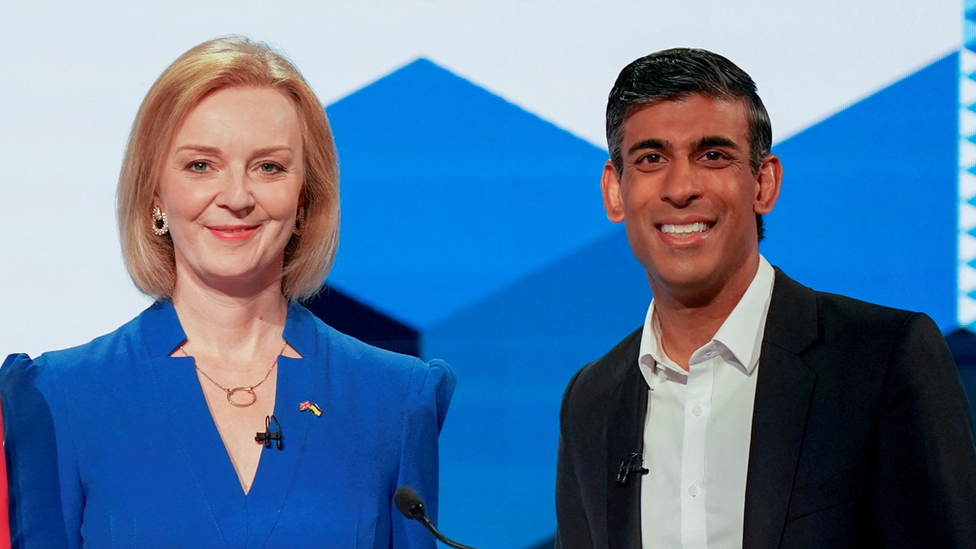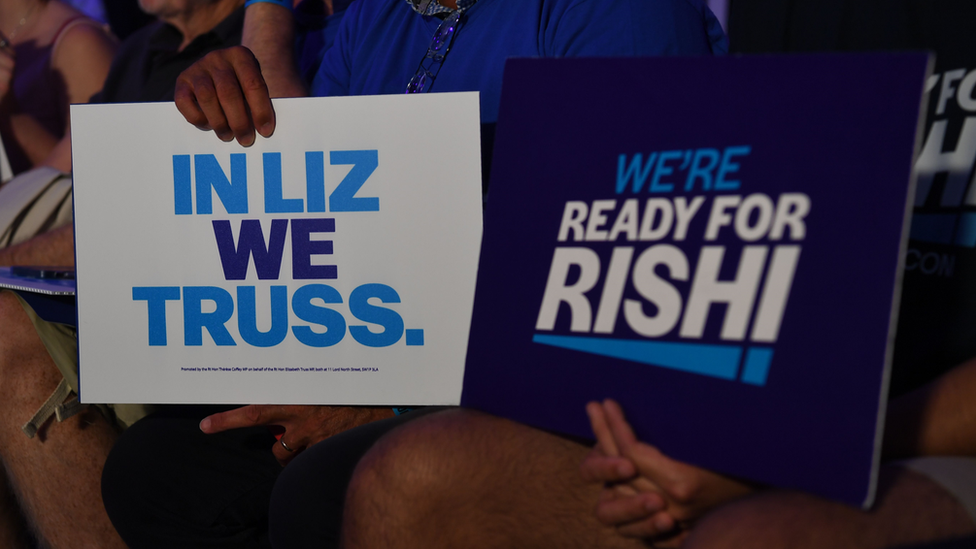What can we expect from Scottish Tory hustings?
- Published

Liz Truss and Rishi Sunak are competing the for the votes of Conservative members
The Conservative leadership contest is heading to Scotland, with Rishi Sunak and Liz Truss to take part in a hustings event in Perth. What are the big issues of the day likely to be, and which candidate is the more popular with Tory members?

It may seem like the Conservative leadership contest has been going on for about five years, but somehow there are still three weeks to go until one of the two contenders enters Downing Street.
That means there may still be time for them to win over some crucial votes - good news for Rishi Sunak, with Liz Truss seen as the clear frontrunner.
Scotland has not been a huge focus of the campaign so far. That might be because the contest thrives on where the candidates differ, and they are in broad agreement about affairs north of the border.
Both are critical of the SNP and the Scottish government; both would refuse to back an independence referendum; and both want to do more to push their policies UK-wide.
That last point is controversial with Scottish ministers at Holyrood, who will fiercely resist any move which could cut across devolved areas.
But it's red meat to Tory members who want to see UK ministers "stand up to the SNP". And this is a campaign aimed squarely at those Conservative card-holders.
Take for example Ms Truss's earlier comments about Nicola Sturgeon being an "attention seeker" who was best ignored.
She was criticised by opponents and indeed some Scottish Tories, who saw the comments as making the job of winning over Scots more difficult.
But they were cheered to the rafters by the Tory members in the room. The same happened again at a television debate where Ms Truss declined to apologise.
This is a leadership process which places a considerable incentive on tough talk.
Liz Truss criticised Scotland's first minister before ruling out a second independence referendum
So given that the two candidates agree on the key Scottish issues, they will want to be as compelling as possible in those positions if they are to elicit such cheers.
If they are both against a referendum, they're only going to stand out in this race by stating that ever more strongly. It becomes a case of "who hates indyref2 the most".
That's particularly the case given that the preview lines released by the two campaigns are procedural in the extreme.
Mr Sunak wants the Scottish government's top civil servant to face a Westminster committee once a year; Ms Truss wants to extend full parliamentary privilege to MSPs so that backbenchers can ask tougher questions of government.
Those might be interesting innovations in a very particular niche of constitutional politics, but they are not going to set the pulses racing among party members.
The traditional battleground of tax is also blunted somewhat by the fact that some major fiscal powers are devolved to Holyrood. That makes it a more complicated pitch for the candidates, and makes it more likely they will lean on tried and tested constitutional lines.

Talking of party members, who are they going to support?
Scottish Tory MPs and MSPs took a while to come off the fence in this contest. They have been burned in the past, having overwhelmingly backed Jeremy Hunt over Boris Johnson.
Many of them backed other candidates, such as Tom Tugendhat and Kemi Badenoch. Others were simply honestly undecided.
It was particularly difficult to find backers of Ms Truss in the early days of the contest. But as she has grown into the race and become the favourite among pollsters and bookmakers, she has also outstripped Mr Sunak in terms of support among MSPs.
From the MP group she now also has the backing of former Scottish Secretary David Mundell. It can be interesting to monitor the positions of MPs in terms of who might be hoping for a job in the next administration - particularly that very job of Scottish Secretary.
All of that said, there are still some Scottish Tories who continue to say they want to hear more specific discussion of local policies before they make up their minds.
They may also want to look the candidates in the eye in Perth and really test their attitude and tone when it comes to the issues where they have a settled position.
How serious are they, really, when it comes to the union, and to holding their own against the Scottish government?
And which of them will be a better sell to the broader mass of voters north of the border when it comes to a future election? Which of them can beat Labour and the SNP?
Because after the three remaining weeks of this contest drag by, the winner is going to need to turn their attention to the country as a whole. This campaign is only the beginning.